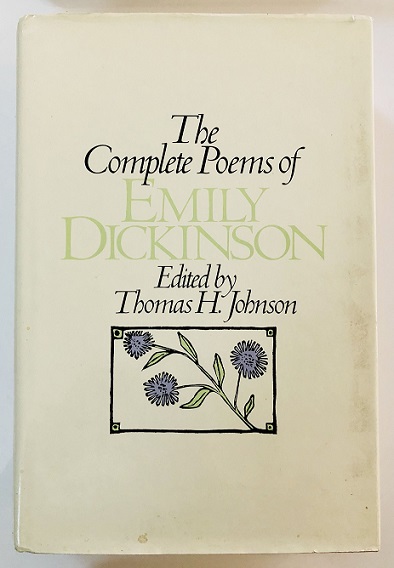|
home | what's new | other sites | contact | about |
||
|
Word Gems exploring self-realization, sacred personhood, and full humanity
Emily Dickinson This World is not Conclusion
Emily Dickinson (1830-1886)
This World is not Conclusion.
A Species stands beyond - Invisible, as Music - But positive, as Sound - It beckons, and it baffles - Philosophy, dont know - And through a Riddle, at the last - Sagacity, must go - To guess it, puzzles scholars - To gain it, Men have borne Contempt of Generations And Crucifixion, shown - Faith slips - and laughs, and rallies - Blushes, if any see - Plucks at a twig of Evidence - And asks a Vane, the way - Much Gesture, from the Pulpit - Strong Hallelujahs roll - Narcotics cannot still the Tooth That nibbles at the soul -
from https://www.litcharts.com/poetry/emily-dickinson/this-world-is-not-conclusion Our time on earth isn't all that there is. Something exists beyond death—invisible as music, but just as real as sound. This other world invites us to come closer, and it perplexes us; philosophy can't explain or confirm it, and even great wisdom must accept that this puzzle doesn't seem to have an answer. Scholars can't guess whether the other world is there—but, for the sake of getting there, people have endured the world's scorn, and even been martyred. Faith sometimes stumbles in thinking about the afterlife, and laughs nervously, and tries to get back on its feet, blushing with embarrassment if anyone notices it faltering; it grasps at the tiniest slivers of evidence and looks to a weathervane to see if it can point the way toward an answer. Up in the pulpit, preachers wave their arms and cry "Hallelujah!" But there's no drug that can numb the pain of doubt, which gnaws away at the soul. This poem begins with a bold declaration: "This World is not Conclusion." In other words, this life and this world is not the only one: something "stands beyond" the life we know. But as the speaker explores this notion further, their confidence falters. They simply can't say why they believe in a world beyond this one, and that leaves them grasping for an assurance that they can never find. Even an intense intuition of an afterlife, the poem suggests, is not quite strong enough to keep fear and doubt from "nibbl[ing] at the soul." Some part of the speaker is absolutely certain that there's a life after this one. They're sure of it in the same way that they're sure of music, which—though "invisible"—is also "positive," most definitely and inarguably real. That melodious simile suggests this intuited afterlife feels alluring, too: it "beckons" like the sound of a distant violin. But even as the afterlife beckons, it "baffles," refusing to come out and show itself plainly. The speaker's sense of the world to come is purely intuitive, founded on nothing that one could call evidence, exactly. That's because there's no evidence to be found, no way to prove that an intuition in a life after death is real. As the speaker bluntly puts it, "Philosophy don't know"; "sagacity" (or wisdom) is no use at all in unravelling the great mystery. Even "Faith" itself stumbles sometimes in the face of this problem and "plucks at a twig of Evidence," searching for some kind of external support. In the end, the speaker says, philosophy, science, religion, and other such "narcotics" are no help: none can blunt the needly "Tooth" of doubt, which gnaws away even at those who feel in their bones that "this World is not Conclusion." Or, at the very least, none of these supports is any help to the speaker, who's left suspended between intuitive faith and rational uncertainty. The first lines of this poem appear to be the speaker's fervent declaration of faith:
In other words: there is a world and a life beyond the one we know; the "conclusion" of life here isn't the end. What lies in the "beyond," exactly, the speaker can't say. It's just a "species," a something, and it's as "invisible, as Music." But it's also "positive, as sound." Those paired similes suggest that the speaker's faith in the world beyond relies on a kind of perception very different from the ordinary. As the cliché has it, seeing is believing—but the world after ours most definitely cannot be seen. Thus, metaphorically speaking, it can't be understood, defined, or confirmed. Nonetheless, it can be perceived, as music can. There's no arguing that something doesn't exist just because you can't see it; sound is the proof. By presenting the other world as a phenomenon like music, the speaker doesn't simply suggest that it's invisible but real. They also hint that it feels as alluring and haunting as the sound of a distant pipe over the hills.
late 14c., in logic, "a class of individuals or things," from Latin species "a particular sort, kind, or type" (opposed to genus), originally "a sight, look, view; outward appearance, shape, form," a derivative of specere "to look at, to see, behold" (from PIE root *spek- "to observe"). In English it is attested from 1550s as "appearance, outward form." Latin species "a sight; outward appearance" had many extended senses, including "a spectacle; a mental appearance, an idea or notion;" also "semblance, pretext; manner, fashion; display, beauty; a likeness or statue; reputation, honor." Typically it was used in passive senses. Also compare spice (n.). In Late Latin, in logic and legal language, it acquired the meaning "a special case," especially (as a translation of Greek eidos) "a class included under a higher class; a kind; a sort; a number of individuals having common characteristics peculiar to them." The notion (as Lewis & Short puts it) is "The particular thing among many to which the looks are turned." The English word is attested from 1560s as "a distinct class (of something) based on common characteristics." The specific use in biological sciences in reference to groups of living things recognizably distinct from all others by their inherited characteristics is from c. 1600, but the exact definition never has been settled.
1775 poems
|
||
|
|

